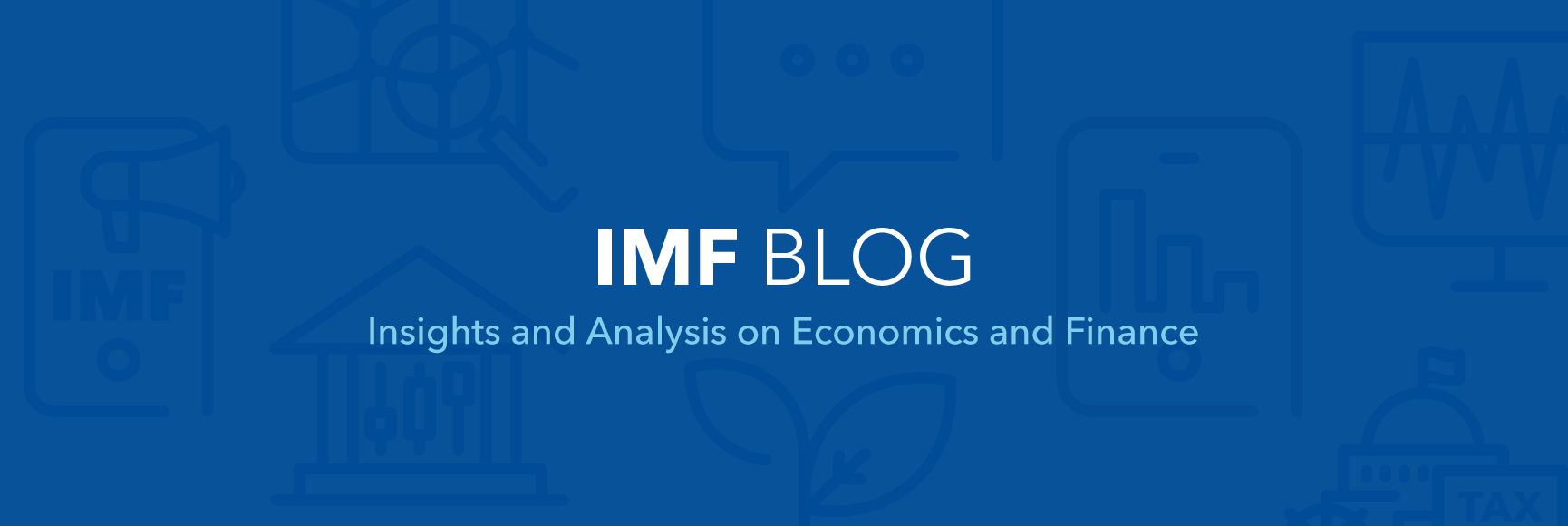Socrates’ famous method to develop his students’ intellect was to question them relentlessly in an unending search for contradictions and the truth—or at the very least, a great quote.
The method was alive and well among the moderators, panelists and audiences of the IMF’s Spring Meetings seminars that took place alongside official discussions, where boosting high-quality growth, with a focus on the medium term, was at the top of the agenda. Our editors fanned out and found a couple of big themes kept coming up. Here are some of the highlights.
Monetary policy
Lots of people are talking about what happens when the flood of easy money into emerging markets thanks to low interest rates in advanced economies like the United States slows even more than it has in the past year.
At a seminar on fiscal policy the discussion focused on the challenges facing policymakers as central banks slowly exit from unconventional monetary policy and interest rates begin rising.
A live poll of the audience found 63 percent said the global economy remains weak and unconventional monetary policies should remain in place.
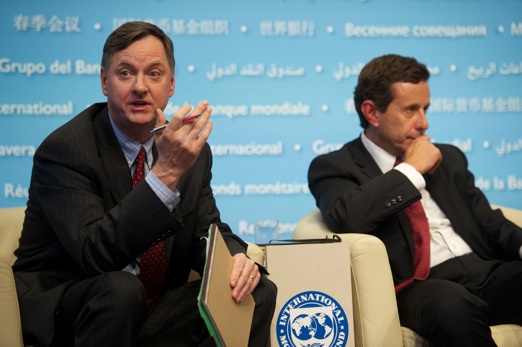 “One of the big risks is that we withdraw our accommodative policies prematurely,” said Charles Evans President, Federal Reserve Bank of Chicago. Evans also stressed that inflation around the world is low.
“One of the big risks is that we withdraw our accommodative policies prematurely,” said Charles Evans President, Federal Reserve Bank of Chicago. Evans also stressed that inflation around the world is low.
“I think that’s a sign of weakness, and I think that’s a sign of risk,” he said.
In a full day discussion of what monetary policy ‘s new normal might look like, Axel Weber, Chairman of Zurich-based UBS, said the global economy is returning to normal, and higher returns in more advanced economy markets always leads to a reversal of capital flows, which means volatility for emerging markets.
“So get used to the new normal,” said Weber.
Emerging economies
What emerging markets are thinking and doing about this was another hot topic.
The U.S Federal Reserve should consider the impact on other countries of its plan to gradually taper its policy of quantitative easing, said the head of the Reserve Bank of India, Raghuram Rajan during a day long series of panel discussions on emerging markets.
“Sensitivity to conditions in emerging markets while exiting would be useful,” said Rajan, who added that “what the Fed does now affects what the emerging markets do going forward.”
Others thought emerging markets should equip their economies with the right tools to deal with the impact of Fed tapering, which includes deeper local financial markets that can offer more products, services and liquidity.
“There is no substitute for good, sound policies,” said Rodrigo Vergara from the Central Bank of Chile. “We have sound fiscal policy. You might want to try to start a pension fund, but if you don’t have sound fiscal policy it won’t work. We have deep markets, and deep institutions.”
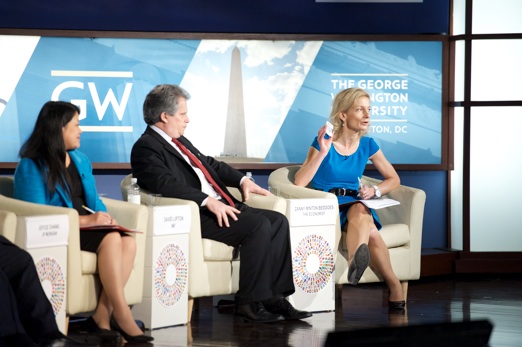 In another live poll during a panel discussion, 56 percent of the audience said domestic factors are key to growth in emerging market economies.
In another live poll during a panel discussion, 56 percent of the audience said domestic factors are key to growth in emerging market economies.
Liaquat Ahamed, Pulitzer Prize-winning author of The Lords of Finance said the U.S. Federal Reserve does have a key role to play in resolving a liquidity crisis, as it did following the Lehman Brothers collapse in 2008.
“But that is different from saying the Fed should conduct its day-to-day monetary policy with a view to avoiding spillovers,” Ahamed noted.
In the monetary policy seminar, Adair Turner, former chair of the U.K.’s Financial Services Authority, said that emerging markets and other countries should use macroprudential policy to guard against the impact of capital flows.
“You can’t ask advanced economies central banks to put on a global hat,” he said.
The audience from a seminar on emerging markets earlier in the week begged to disagree. In another live poll, 70 percent said the U.S. should take into account the impact of its policies on other countries.
U.S. central bank policy is not the main worry of all emerging market economies.
“The main risk for Chile isn’t taper, it’s China,” said Vergara. “China is Chile’s main trading partner and main consumer of their commodities. When you see that credit has gone from 120 % to 180 % you think about a financial crisis.
If you’re looking for more to worry about in the global economy, you should take Gillian Tett’s advice. The Financial Times columnist gave kudos to the recent Global Financial Stability Report chapter on emerging economies.
“It’s jam packed with fantastic statistics and graphs, and scary ones too,” said Tett.
Growth & more
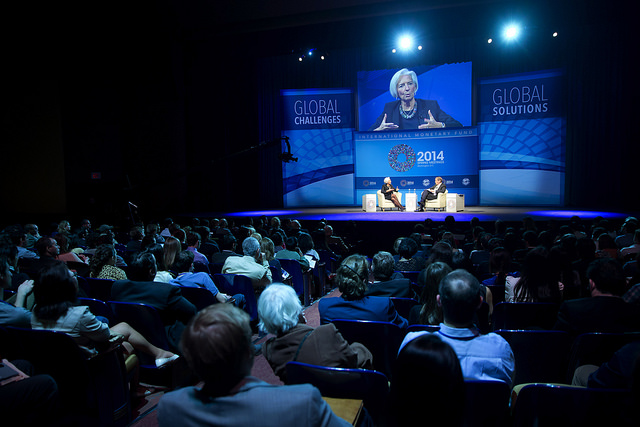 In a conversation with PBS anchor Charlie Rose, IMF head Christine Lagarde talked about the global outlook and how policymakers’ concerns are now shifting from crisis recovery to creating durable and sustainable growth. To get there, countries need, among other things, key structural reforms in labor markets, infrastructure and other areas.
In a conversation with PBS anchor Charlie Rose, IMF head Christine Lagarde talked about the global outlook and how policymakers’ concerns are now shifting from crisis recovery to creating durable and sustainable growth. To get there, countries need, among other things, key structural reforms in labor markets, infrastructure and other areas.
There were also seminars on Africa, the Middle East, and IMF’s turning 70 this year that you can watch online.
Inequality
Rising income inequality is now acknowledged as a critical economic, social and economic issue for everyone. Christine Lagarde is talking about it, the IMF’s chief economist Olivier Blanchard is talking about it, and the IMF has new research on redistributive policies to curb inequality and the potential trade-off between redistribution and growth.
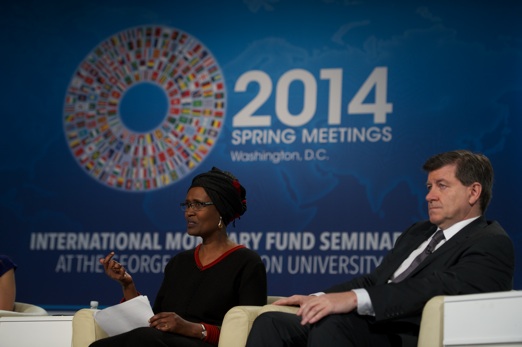 Speaking on why inequality should be at the top of policymakers’ agendas, Winnie Byanyima, head of Oxfam International, said that “inequality is morally wrong…it is a real threat to democracy.”
Speaking on why inequality should be at the top of policymakers’ agendas, Winnie Byanyima, head of Oxfam International, said that “inequality is morally wrong…it is a real threat to democracy.”
“A consensus has emerged. The IMF says more equality brings more growth. The World Bank says the same. Obama says he cares about inequality. Even God is on our side. Look at what the Pope said.”
The question is, what are we going to do about it?
Contributors: Gita Bhatt, Maureen Burke, Jacqueline Deslauriers, Glenn Gottselig, Lika Gueye, Hyun-Sung Kang


